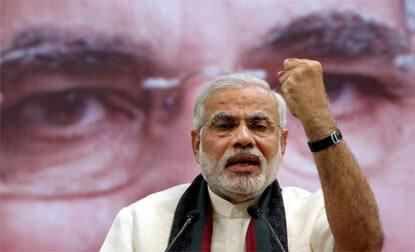 Arunachal Pradesh, Feb 22: Wading into a foreign policy issue for the first time, Narendra Modi on Saturday asked China to shed its "expansionist mindset", making it clear that no power on earth can snatch Arunachal Pradesh from India.
Arunachal Pradesh, Feb 22: Wading into a foreign policy issue for the first time, Narendra Modi on Saturday asked China to shed its "expansionist mindset", making it clear that no power on earth can snatch Arunachal Pradesh from India.
"China should shed its expansionist policy and forge bilateral ties with India for peace, progress and prosperity of both the nations," the BJP's prime ministerial candidate said addressing a meeting here in his current election campaign.
"Arunachal Pradesh is an integral part of India and will always remain so. No power can snatch it from us. People of Arunachal Pradesh didn't come under pressure or fear of China," he said.
"I swear in the name of this soil that I will never allow the state to disappear...breakdown and to bow down," Modi said to a thunderous applause from people gathered near the mighty Siang River.
He said China should shed its expansionist mindset because the world of today does not accept it. The entire world is moving towards development, he said.
"China needs to change its stand. China should shed its expansionist mindset and adopt the plank of development. Focus is on the development all over the world," the Gujarat Chief Minister said.
Lauding the patriotic nature of the people, Modi said that because of the people, who were guarding the state as well as the country as sentinels, Arunachal remained an integral part of the country.
"The people here are real patriots as they salute their counterparts with 'Jai Hind' and are zealously protecting the state's territory..... They gave a befitting reply to the advancing Chinese army during 1962 and the British and several army personnel from the state also fought with Pakistan during the Kargil war," he said.
While directly referring to the January 29 murder of Arunachal Pradesh youth Nido Tania in Delhi, Modi cautioned the UPA government against underestimating the people of the state and added that it was the duty of the entire nation to protect the people and the state's territorial integrity.





Comments
Add new comment